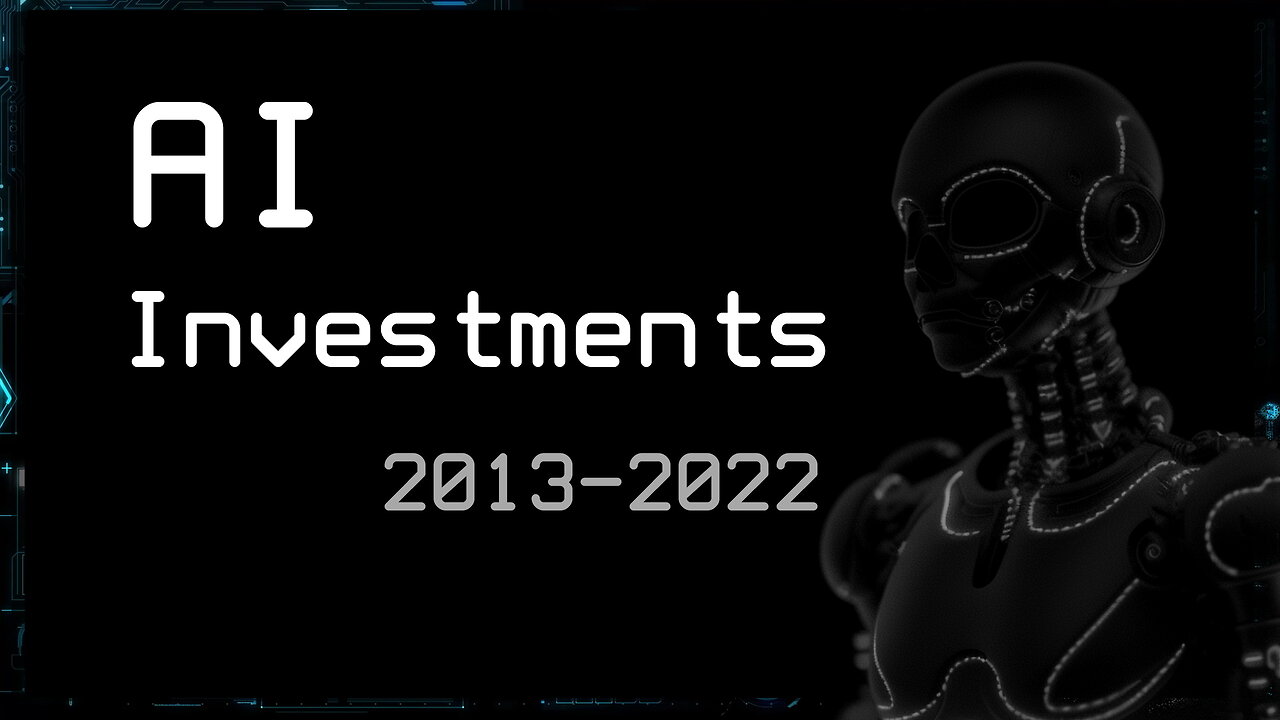Premium Only Content

AI Investments 2013-2022 | Private Sector
This video shows the private investments in Artificial Intelligence (AI) by USA, China, EU and UK (accumulated), and the world (yearly and accumulated), from 2013 to 2022. By focus area, expressed as share of world accumulated, is shown from 2017 to 2022. The data is expressed in inflation adjusted US dollars, and includes companies that recieved more than $1.5 million in investments.
AI has been a hot topic for the past decade, and its advancements have led to significant investments from various sources. From startups to established companies, many have invested in AI to enhance their businesses and gain a competitive edge. In this article, we will look at the AI investments made in the past 10 years and how they have transformed the industry.
According to a report by PwC, the global AI market is expected to grow to $15.7 trillion by 2030, making it one of the fastest-growing sectors in the world. The report also notes that the United States, China, and Japan are the leading investors in AI technology, with the US being the largest spender. In 2020, the US invested over $25 billion in AI, which is almost half of the global spending on AI.
The past decade has seen a significant rise in AI investments, with companies looking to leverage the technology to improve their business processes and create new revenue streams. One of the primary areas where AI has been heavily invested in is machine learning. Machine learning is a subset of AI that involves training algorithms to make predictions and decisions based on data. This technology has been used to improve customer experience, enhance fraud detection, and optimize business operations.
The healthcare industry has seen a significant impact from AI investments, with AI being used to improve patient outcomes, enhance drug discovery, and streamline healthcare operations.
Another industry that has seen a significant impact from AI investments is finance. AI has been used to improve fraud detection, enhance customer experience, and optimize investment portfolios. AI-powered chatbots have also been introduced in the finance industry to provide personalized customer service and support.
Overall, AI investments have transformed the way businesses operate, and there is no doubt that the trend will continue in the years to come. As AI technology continues to advance, we can expect to see even more investments in the sector, with companies looking to leverage AI to enhance their business processes and create new revenue streams. The future of AI is bright, and we can expect to see significant advancements in the years to come.
Some of the most known AI programs: Siri (Apple), Alexa (Amazon), Google Assistant (Google), Cortana (Microsoft), Watson (IBM), Bixby (Samsung), Sophia (Hanson Robotics), Kismet (MIT), AIBO (Sony), Cozmo (Anki), Alphago (Google), Deep Blue (IBM), ELIZA (MIT), GPT (OpenAI), Rasa (Open source), TensorFlow (Google), Caffe (Berkeley AI Research), PyTorch (Facebook), Keras (Open source), OpenCV (Open source)
Source:
Nestor Maslej, Loredana Fattorini, Erik Brynjolfsson, John Etchemendy, Katrina Ligett, Terah Lyons, James Manyika, Helen Ngo, Juan Carlos Niebles, Vanessa Parli, Yoav Shoham, Russell Wald, Jack Clark, and Raymond Perrault, “The AI Index 2023 Annual Report,” AI Index Steering Committee, Institute for Human-Centered AI, Stanford University, Stanford, CA, April 2023.
The AI Index 2023 Annual Report by Stanford University is licensed under Attribution-NoDerivatives 4.0 International.
Music:
Diamond Ace - Ulterior Motives https://soundcloud.com/diamond-ace-music/ulterior-motives
Special intro background effect by NCF https://www.youtube.com/@NoCopyrightFootages
Data visualization created with flourish.studio
-
 35:29
35:29
Candace Show Podcast
2 hours agoMANHANDLED! Mr. Macron Pummels The French President. | Candace Ep 190
7.61K17 -
 LIVE
LIVE
LFA TV
19 hours agoLFA TV LIVE STREAM - TUESDAY 5/27/25
3,278 watching -
 LIVE
LIVE
Chrissy Clark
40 minutes agoJordan Peterson’s Debate Fail, NPR Sues Trump, & Dems Spend $20M To Understand Why They’re Losing
140 watching -
 LIVE
LIVE
freecastle
5 hours agoTAKE UP YOUR CROSS-Crawling Out Of The Rubble In The RED, WHITE, AND BLUE!
36 watching -
 47:43
47:43
"What Is Money?" Show
2 hours agoWiM Live at Bitcoin 2025 w/ Saifedean Ammous
35.9K1 -
 2:16:09
2:16:09
The Quartering
4 hours agoJoe Rogan BOMBSHELL Could Change America, Bongino Blasted Again, Trump SCORCHES Harvard & NPR
126K40 -

Pop Culture Crisis
2 hours ago'Harry Potter' Main Cast REVEALED, Bella Ramsey 'Most Hated' Actor? Celebs DITCH The AMAs | Ep. 843
22.4K5 -
 LIVE
LIVE
The HotSeat
2 hours agoBehind Enemy Lines with Sheriff Chad Bianco!
675 watching -
 10:52
10:52
Silver Dragons
2 hours agoWhat Will Cause Silver Price to EXPLODE to $100?
5.6K1 -
 LIVE
LIVE
StoneMountain64
4 hours agoGoodbye Downtown - Warzone Season 4 is COMING
278 watching